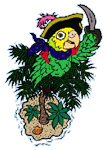 |

|
||||||||||
 |
 |
 |
 |
 |
 |
|
 |
||||
|
New Developments in Avian Medicine by Dr. Tammy Jenkins, DVM Psittacine birds (Parrots) are susceptible to a large number of contagious diseases. Most of these diseases are potentially fatal, and at best account for bouts of illness in affected birds. Up to this point we have controlled the spread of disease by limiting the exposure of birds to one another. However even with rigorous application this technique is hampered by long incubation periods of many of these viruses (up to several years), which allow carriers to infect whole groups of new birds before the disease is even clinically apparent. Finally we have a new method to protect our birds. This year (1996) the new polyoma virus vaccine has been conditionally approved. Vaccines along with new sensitive testing procedures will help reduce the fear of a new bird bringing disease into your household. Vaccines allow us to practice preventative medicine. Instead of treating sick birds, we can prevent birds from becoming sick in the first place. Hopefully this will be the first in a series of vaccines designed to combat psittacine disease
More New Developments in Avian Medicineby Terry Beaudoin, as related by Dr. Tammy Jenkins, DVMOn Monday September 23rd, 1996, Dr. Jenkins was kind enough to come out to the store and update me on the results of the 1996 Association of Avian Veterinarians Conference. To say that she was excited about the results would be a vast understatement. I will attempt to relate the most important parts of our conversation as it applies to the ownership of birds as pets. The new polyoma vaccine has been shown to be safe and very effective and the avian veterinary community is now recommending its usage wholeheartedly. Sometime in the next six months Dr. Branson Ritchie, (one of the primary veterinarians responsible for the growing understanding of viral disease control in pet birds), expects to have a conditional combination polyoma /Pacheco's virus vaccine available. It was also stated that there has been great headway made in the developments of vaccines for psitticine beak and feather syndrome as well as psittacosis. Dr. Ritchie recognized Dr. Jenkins at the conference for her observational work on wasting disease. He stated that her findings were of great importance in their understanding of this disease and the eventual development of a conditional vaccine. Dr. Jenkins also informed me that there are now much more accurate tests for polyoma, psitticine beak and feather syndrome and psittacosis. These advances in viral disease control are of the greatest importance to us as pet bird owners. Once we have the ability to have our birds accurately tested and protected from the highly contagious viral diseases it will give us the opportunity to socialize our birds with other bird owners and their birds as well as the eventual possibility of a behavioral training class for birds and their owners. Up until that time introducing your bird to other birds is highly risky and we do not recommend it. (* Anyone who has seen me hurdle the sales counter to try to prevent someone from touching our birds before they have washed their hands will recognize another benefit). Another series of topics of interest to pet bird owners that was discussed at the conference had to do with the products that we purchase for our birds. This included health issues involving both the cleanliness of products purchased and the materials in these products. Dr. Jenkins told me that there have been cases of some of the viruses that are long-lived outside the bird's body, (i.e.. polyoma), having been transmitted on products, (cages, toys, etc.), that were purchased at pet stores or breeders who had poor disease control practices. Purchasing toys from Bird Fares and toy makers that you do not know can lead to risk. Do you know for sure that toys were not made around birds? Know your source. At Parrot Island we give our utmost attention, (by only purchasing our birds and other products from quality sources), to preventing any disease causing agents from entering our store. However, because we have customers entering our store and handling our toys, cages, etc. we feel that the safest thing for our customers to do is to wash any new products as best they can and if possible to sterilize them. If you are purchasing products from one of the various 'high volume' pet stores or Bird Marts - be very careful, rarely do they practice even the simplest of disease control methods. Inexpensive metal cages were the main focus of the discussion on unsafe materials sold for birds. Many of these economy cages have zinc used in their finishes. Zinc is highly toxic to birds. A number of birds that were housed in these cages have been seen with this toxicity. This is yet another reason why we tell our customers not to skimp on the cage they purchase as their bird's home. Contact us for information on safe products to use for cleaning. Additional Veterinary articles:
|
Copyright
© 2000-2003 Parrot Island, Inc.
Send mail to webmaster with
questions or comments about this web site.